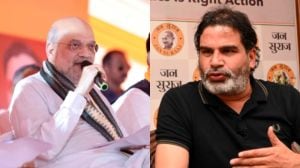The floating voter can make you sink
If we would learn what the human race really is at bottom, we need only observe it at election times. Mark Twain (1835-1910) ‘‘Mu...

If we would learn what the human race really is at bottom, we need only observe it at election times.
Mark Twain (1835-1910)
‘‘Mulual funds are not bought, they are sold,’’ goes the adage in the booming asset management industry of which I was once a part of. As Elections 2004 unfold, I am tempted to draw an analogy from the unit sales experience, ‘‘Elections are not won, they are lost.’’
We have some classic examples: the cold, clinical, clairvoyant Al Gore of the Democratic party in the US elections of 2000 who despite possessing a yawning lead in opinion polls, and also having strong administrative experience of serving as a Vice President for eight years under the beguiling charms of the inimitable and highly popular Bill Clinton, gave it all away on a silver platter to the fickle, fumbling George Bush. Finally, even heavenly benedictions sided with the mercurial Bush in Florida, the rest as they say is history. Or is it?
In the recent Chhattisgarh Assembly elections, Ajit Jogi’s over-ambitious machinations and political craftiness — a clear case of overkill, allowed a blatantly corrupt Dilip Singh Judeo and the BJP to usurp power. And it all happened like a bolt from the blue, in a sudden blinding flash.
If recent pre-election surveys were to be seriously consumed, then the BJP/NDA combination’s victory was a mere formality — the only debate ranging to its margin and magnitude. But in a land of 67-crore voters, even the largest sample size of 45,000 amounts to a meaningless number (0.006714%) given the day-to-day fluctuations on account of national issues, fresh charges and counter-accusations, announcement of candidates, local issues, media articles, etc.
A woman from Pune recently told me she has changed her mind on voting for the BJP because ‘‘how can India be shining when my house is in complete darkness on account of power cuts which herald the commencement of the summer season.’’ It is downright naive on the part of any political party to believe that there are ‘‘committed voters’’ — other than dedicated party workers, caste and community affiliations and religious blocks, who shall fall in any gullible trap, notwithstanding exaggerated claims and election hyperbole. Barring the hardcore Hindutva elements, remnants of Leftist ideology and sundry lumpen groups — the vast majority of voters remain ‘‘floating voters’’ till the vote is really cast in the election booth.
There is no ‘‘ideology buy-in,’’ it is pure pragmatic self-preservation of the masses which is the influential factor. Sometimes, herd mentality driven by the household’s key earning member decides the outcome. Which is why despite the optimistic prognostications made by various poll surveys, the usually smug Pramod Mahajan isn’t exactly laughing all the way. And Arun Jaitley does exhibit a modicum of moderation behind his characteristic over-confidence. And it is this unpredictable, last-minute ‘‘floating voter’s final second switch’’ syndrome which is making the BJP give counting a break and cross its fingers.
Look at the straws in the wind — and there are enough. Why on earth would a political party which has by official admission (the speculated numbers are embarrassingly astronomical) spent Rs 65 crore on an India Shining campaign with such cool-as-cucumber aplomb be suddenly sweating under the collar? Surely, Prime Minister Atal Behari Vajpayee did not call for early elections only to remind us of his and his party’s monotonous rendition that Congress president Sonia Gandhi was born in Italy.
As the grim realities of Satyendra Dubey, farmer suicides, record unemployment, on-tape corruption scandals sneak on to the radar, Sonia’s foreign origin is once again the sole electoral drumbeat the BJP is hoping to create a crescendo around.
And now that the irrepressible Mahajan feels that even Rahul and Priyanka Gandhi are virtual foreigners, the chinks in the armour are showing.
If you are riding horseback to the winning post, you don’t need to stoop low. But the BJP, it seems, is realising that the sheen of its India Shining campaign is wearing thin in the electoral heat and the dust. Anyways, that campaign was targeted only at the urban Indian middle-class which the BJP believes is the slothful, easily-satisfied, self-centered voter, currently happily ensconced in the ‘‘mobile, mall and multiplex’’ zone, and is, therefore, strongly inclined towards voting for it. With rural interiors and vast masses of poverty-stricken India not even aware of what those words mean, the urban middle-class vote has become a do-or-die segment for Mahajan and his electoral hunter-gatherers.
The personal attacks against the Gandhi family is a manifestation of BJP’s desperation to not lose the shifting middle-class segment which has been the biggest buyer of the consumerist boom story. But the hard truth is that the same audience which watches Kyunki Saas Bhi Kabhi Bahu Thi is also sensitive enough to repudiate the Praveen Togadias and the Vinay Katiyars. Is that why they have been asked to zip up? For, the BJP knows that it cannot take the urban Indian middle-class sensibilities for granted.
The battle for Elections 2004 may have actually just begun with over 183 seats to be voted for on May 10, 2004, still a month away. It’s not just the last-mile finish which will determine the winner of this election. It is the last second whimsical turn or decision of the floating voter — undecided, unsure, uncertain which will.
The writer is a communications consultant, focussing on public affairs and business



- 01
- 02
- 03
- 04
- 05




























